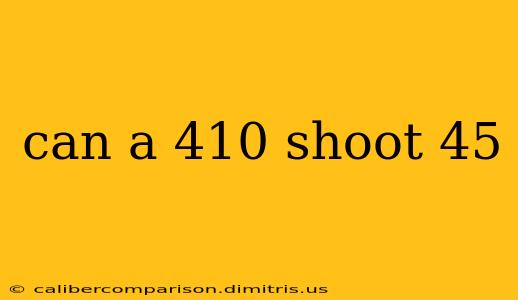Can a .410 Shoot .45 Caliber Rounds? A Definitive No, and Why It Matters
The short answer is a resounding no. A .410 shotgun cannot shoot .45 caliber rounds. These are entirely different cartridges designed for different firearms with vastly different mechanisms. Attempting to do so would be incredibly dangerous and could result in serious injury or death.
This misconception likely stems from a misunderstanding of firearm calibers and gauges. Let's break down the key differences:
Understanding Gauges and Calibers
-
Gauge: This refers to the diameter of a shotgun barrel. It's determined by the number of lead balls, each with the diameter of the barrel, that would weigh one pound. A .410 bore is a relatively small-gauge shotgun.
-
Caliber: This refers to the diameter of a bullet, usually measured in inches or millimeters. A .45 caliber bullet has a diameter of .45 inches.
The fundamental difference is the projectile and the method of firing. Shotguns fire shot (small pellets) or slugs (a single projectile), while pistols and rifles fire cartridges containing a bullet, gunpowder, and a primer. The .410 bore is designed to handle the pressure generated by its own ammunition; it is not designed to handle the significantly higher pressure of a .45 caliber cartridge.
The Dangers of Mismatched Ammunition
Attempting to force a .45 caliber round into a .410 shotgun barrel would likely result in one or more of the following catastrophic failures:
-
Barrel Burst: The immense pressure generated by the .45 caliber round would far exceed the .410 barrel's design limits. This could cause the barrel to rupture, sending shrapnel towards the shooter and anyone nearby.
-
Gun Malfunction: The round might not even chamber properly, causing a potentially dangerous jam. Trying to force it could further increase the risk of a barrel burst.
-
Catastrophic Injury: Even if the round did fire (which is highly unlikely), the projectile would likely be severely damaged or the gun would malfunction leading to significant injury to the shooter.
Safe Gun Handling Practices
Safe gun handling is paramount. Always ensure you are using the correct ammunition for your firearm. Never attempt to fire a round that doesn't match your firearm's specifications. If you are unsure about anything relating to firearm safety or ammunition, consult a qualified firearms expert or refer to your firearm's owner's manual.
This information is for educational purposes only and should not be considered a substitute for professional firearm safety training. Always prioritize safety when handling firearms.

